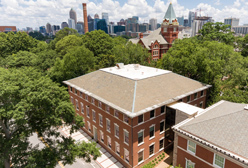Recent Books by Faculty
Résistances à la modernité dans la littérature française de 1800 à nos jours / Resistances to Modernity in French Literature (1800-2010) (L'Harmattan, Paris) edited by Christophe Ippolito, Assistant Professor, School of Modern Languages. With twenty-six essays on authors, from Chateaubriand to Houellebecq, who resist(ed) modernity, this cultural history of the antimodern movement illuminates the evolution of French society from 1800 to 2010.
Crafting Truth: Documentary Form and Meaning (Rutgers University Press) by Louise Spence (Kadir Has University, Istanbul) and Vinicius Navarro , Assistant Professor, School of Literature, Communication, and Culture. This book explains that documentary sounds and images are always the product of the filmmaker's choices. It illuminates the techniques that filmmakers use to shape a viewpoint, the implications of these choices, and new ways of thinking about nonfiction film.
What Does Georgia Tech Think?
Selected Press for Ivan Allen College of Liberal Arts
|
On the Proposed Plan for Georgia Income Tax Reform
"Overall, it is not a tax increase," wrote Christine Ries, about recommendations made to Georgia lawmakers by the Special Council on Tax Reform and Fairness for Georgians. A professor in the School of Economics and member of the Council, Ries said, "We were very careful to avoid that. It shifts from income to consumption tax. It's now a flat tax and moving to a fair tax." Read full article in Marietta Daily Journal - January 18, 2011. Listen to Ries' interviewed live about the council's recommendations on the Tax Foundation's January 20 Tax Policy Podcast
On Bioterror Defense
“There is a fundamental need for basic science. The low-hanging fruit has all been picked,” said Margaret Kosal, Assistant Professor in the Sam Nunn School of International Affairs, about the limitations of genetic science that have prevented the success of the Pentagon’s program to develop treatments for troops and civilians infected in a germ warfare attack. Kosal worked on the program between 2006 and 2007. Read full article in Boston Globe - January 17, 2011
On Connecting Poetry with Economics, Science, and Engineering
“I was teaching economics at the Georgia Institute of Technology when I made the haiku-economics connection. I needed to connect with 225 economics, science, and engineering majors—college kids who were being trained to believe that poetry and feelings are not important to, say, the World Bank,” writes economist Stephen T. Ziliak, a former professor in the School of Economics. Ziliak wrote in Poetry magazine that using haiku helps add “feelings to economics.” Read full article in New York Times - January 11, 2011
On Media Standards
Susan Herbst, Professor in the School of Public Policy and President Designate of the University of Connecticut, argues for media professionals to work together on devising rules of discourse in the wake of the shootings in Arizona, which have focused attention on the nature of our political discourse. Herbst recognizes that democracy is by its nature often rude but she also insists there are limits to how uncivil we should be. Herbst’s book Rude Democracy: Civility and Incivility in American Politics explores how we can create a more civil national culture. Read full article in Washington Post - January 11, 2011
On Georgia and National Tax Reform
“Accepting [the proposed tax-reform recommendations] could put Georgia on the forefront of [national] tax reform by shifting the tax burden from income taxes to sales taxes,” said Christine Ries, Professor in the School of Economics and a member of the Georgia Tax Reform Council. “States that aren't reforming are instead boosting taxes on a smaller and smaller number of taxpayers and suffering as a result.” Read full article in Morris News Service - January 8, 2011
On Korda’s “Hero”
“Few historical figures are as intriguing and enigmatic as T.E. Lawrence, the British archaeologist, scholar and writer who became world-famous for his exploits in Arabia during World War I. In a new biography, Michael Korda captures the indomitable, tormented spirit of this extraordinary man," wrote Jonathan Schneer in a review of Korda's book for The Washington Post. Schneer is professor in the School of History, Technology, and Society and author of the award-winning book The Balfour Declaration: The Origins of the Arab-Israeli Conflict. Read full article in Washington Post - January 7, 2011
On New Science and Technologies and Science-Fiction
"We live in a world so profoundly shaped by new sciences and technologies and the new realities they enable. Sci-fi is the one genre that has all these story and character types set up to explore these questions," said Lisa Yaszek, Associate Professor in the School of Literature, Communication, and Culture, and president of the Science Fiction Research Association. "On a basic level, sci-fi is so appealing across media because it's the premier storytelling form of modernity." Read full article in Yahoo News - January 4, 2011
On Smart Trash Recycling
“The whole information system falls off when things are disposed,” says Valerie Thomas, Associate Professor of Public Policy (joint appointment with Industrial and Systems Engineering). Thomas is developing a prototype technology called Smart Trash, which aims to better manage all forms of waste that carry product ID tags and bring curbside recycling up to par with high-tech garbage systems. Source: The Erie Wire - January 4, 2011
On Diversity
“I always invite people to take the long view,” Dean Jacqueline J. Royster said when discussing diversity in the Georgia Tech Alumni Magazine article 'Just Causes'. “When you look at the difference between 2010 and 1810 or 1910, is there a difference in the quality of life for women in this country and internationally? Yes. Is it consistently available or applied? No. Is there any sector where we’re done? No.” Public Policy Professor Mary Frank Fox commented on Georgia Tech's faculty diversity efforts, “I am very proud that Georgia Tech is one of the very few institutions with ADVANCE awards that have addressed tenure and promotion." Read full article in Georgia Tech Alumni Magazine - January 3, 2011
On Theft of Confidential Information
"Theft of confidential information is happening more frequently and getting more difficult to prevent in today's 'connected' world," said Hans Klein, School of Public Policy Associate Professor. Klein added to a story about the theft of a hard drive from Armstrong Atlantic State University, which contained several hundred alumni's Social Security numbers. Klein cited the recent WikiLeaks publication of secret government files that had reportedly been downloaded onto a homemade music CD. "They say all the WikiLeaks information was on one Lady Gaga CD," he said. "There is nothing to it." Read full article in Savannah Morning News - December 30, 2010
On News as Games
“There is nothing medium-specific about journalism, no reason that its output must take the familiar form of text, image or video," writes Ian Bogost, Associate Professor and Director of Graduate Studies in Digital Media. Bogost addresses news as games where players can grasp concepts ignored in traditional media, in his book Newsgames: Journalism at Play, co-authored by Simon Ferrari and Bobby Schweizer. Read full article in Columbia Journalism Review - December 22, 2010
On TSA Inspections
A segment about Transportation Security Administration (TSA) inspections on Fox 5 includes an interview with Margaret Kosal, Assistant Professor in the Sam Nunn School of International Affairs. Kosal focuses on anti-terrorism efforts, and responded to a CBS news report that suggests a potential terror attack in the U.S. involves the possible use of poisons put in salad bars and buffets. Kosal said, "What is important in that regard is to let people know what are potential symptoms, how to respond, to neither overhype this or underplay it." Source: Fox 5 - December 21, 2010
On the Mayor Reed's Plans for English Avenue
"The mayor appears to be interested in kick-starting the redevelopment of English Avenue by re-creating the now defunct Mims Park. Residents may welcome this much-needed amenity but wonder why this is the city's response to their problems. The key to the neighborhood future lies with the residents who already have invested their money and lives. The revitalization and transformation of English Avenue may take longer if we hold off on design-driven development — but if we do, we might get closer to a more durable neighborhood by making revitalization about the people who have been there all along," wrote Harley Etienne, Assistant Professor of Public Policy and City and Regional Planning, about City of Atlanta Mayor Kasim Reed's plans to transform and revitalize the English Avenue neighborhood. Read full article in Creative Loafing - December 20, 2010
On Social Responsibility of the Video-Game Industry
“Movies and games reflect the allure and repulsion that people feel toward violence,” said Janet Murray, Professor of Digital Media in the School of Literature, Communication, and Culture. Murray adds, “Games raise special anxieties because they are active and participatory." Murray is quoted in an article outlining opposition to games like Mafia II, and social responsibility of the video-game industry. Read full article in Bloomberg - December 17, 2010
On the Top Ten Brains of the Digital Future
Janet Murray, Professor in the School of Literature, Communication, and Culture has been named as one of the Top Ten Brains of the Digital Future by Prospect Magazine. “One of the world’s most influential interactive designers, Janet Murray…specializes in connecting research work on artificial intelligence with cultural forms such as games, film, literature and television. With a PhD in English from Harvard, Murray’s work looks ahead to the newly expanded possibilities of expression created by interactive media, and is hugely influential on the cutting edge of game design, interactive television and filmmaking.” Read full article in Prospect Magazine - December 15, 2010
January 25, 2011
12:00 pm
February 14, 2011
12:00 pm
February 17, 2011
7:30 pm
|
College Announces Dean’s Scholarship Program
Ivan Allen College of Liberal Arts announces the establishment of the Dean’s Scholarship Program for incoming freshmen students.
The program will award six scholarships for fall 2011. As many as twelve scholarships may be awarded when the program is fully implemented.
Jacqueline Jones Royster, Dean of the Ivan Allen College of Liberal Arts said, “These scholarships will help fulfill the dreams of students who otherwise might not be able to pursue the innovative technology-centered liberal arts degree programs offered here at Georgia Tech. We are proud and grateful to be able to enlarge the opportunities for young students to be among the problem solvers and innovators, the top tier leaders and global citizens that we graduate from this College.”
Dean’s Scholarships will be awarded to incoming freshman based upon academic performance, leadership, and public service. Recipients will receive $2000 in their first year, with the opportunity for up to $8,000 in total financial support across the recipient’s four years in the College.
Associate Dean John Tone said, “We recognize the financial challenges faced by families today as college expenses rise so we are thrilled to be able to offer this financial support to incoming students.”
There is no application process for the awards. Dean’s Scholarships will be granted each spring.
|
Levine Study Shows that States Now Fund Majority of Human Embryonic Stem Cell Research
States, not the federal government, now fund the majority of human embryonic stem cell research conducted in the United States, according to a recent study by Public Policy's Aaron Levine which was published in the journal Nature Biotechnology.
In addition, states varied substantially in the extent to which they prioritized human embryonic stem cell research, and much of the research performed in the states could likely have been funded by the National Institutes of Health under federal guidelines established by President Bush in 2001.
“While the federal government still contributes more to stem cell research overall, each year since 2007 these six states have funded more human embryonic stem cell research than the federal government,” said Aaron Levine, Assistant Professor at Georgia Tech.
Levine created an online searchable database (http://www.stemcellstates.net/) that allows users to find detailed information about each grant given out by the six states that adopted programs specifically to fund stem cell research. The database currently covers grants given out by California, Connecticut, Illinois, Maryland, New Jersey, and New York from December 2005 to December 2009, and will be updated yearly with new information.
“From what I could tell, only a relatively small portion of the stem cell research supported by these states was clearly ineligible for federal funding,” said Levine, who is on the faculty of the School of Public Policy in the Ivan Allen College of Liberal Arts.
.jpg) Levine reasons this could be a result of the fact that there are many incentives for scientists to work with existing human embryonic stem cell lines rather than creating new ones. Levine reasons this could be a result of the fact that there are many incentives for scientists to work with existing human embryonic stem cell lines rather than creating new ones.
He said he was surprised at how great the difference was among states in the share of grants that supported human embryonic stem cell research. While Connecticut and California devoted 97 percent and 75 percent of their grants to this research, New Jersey and New York steered only 21 percent to this contentious field.
One reason for these differences may be the development of induced pluripotent stem cells, which are derived from adult body cells rather than from embryos. More recent programs, such as New York’s, may be disproportionally focusing on this new technology.
“There’s no question that these state programs drew a lot of scientists into the field,” said Levine. “An interesting question going forward is how committed these scientists are to stem cell research or if they are relating their work to stem cells now simply to be eligible for state funding – that’s unknown right now.”
|
Peacebuilding in the Information Age: Sifting Hype from Reality
January 10, the anniversary of the devastating earthquake in Haiti, marked the release of the first in a series of edited volumes examining the increasingly important role of information and communication technology (ICT) in conflict prevention, peacebuilding, peacekeeping and crisis response.
The collection, “Peacebuilding in the Information Age: Sifting Hype from Reality” was developed by Georgia Tech working with the ICT4Peace Foundation (Geneva, Switzerland) and the Berkman Center for Internet and Society at Harvard University. Michael Best, Assistant Professor, Sam Nunn School of International Affairs, guides Georgia Tech’s collaboration with the ICT4Peace Foundation and co-edited the papers with Daniel Stauffacher, Barbara Weekes, Urs Gasser, and Colin Maclay.
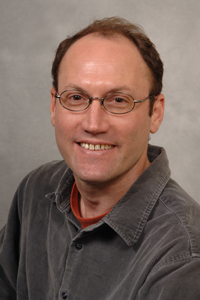
The goal of the collection is to encourage meaningful debate and action on how to solve the challenges and enhance the opportunities in the effective use of ICTs in peacebuilding and crises response. Included in the collection are essays by former Finnish President and Nobel Peace Prize Winner Martti Athisaari and a “younger generation of cutting edge practitioners and scholars in this fast moving space.” Best and his colleagues intend the collection to transcend current debate and positive hype about ICTs to probe difficult questions, and provide concrete recommendations.
On September 23rd, 2010, Michael Best moderated the International Development Research Centre's second Harvard Forum "Communication and Human Development: The Freedom Connection?" Best is a fellow at the Berkman Center which hosted the forum. Panelist were Nobel Laureates Amartya Sen and Michael Spence and leading Information and Communication Technology (ICT) experts Yochai Benkler and Clotilde Fonseca. The public discussion focused on the role of communication and ICTs in human development, growth and poverty reduction. View video of the forum (at bottom of page).
|
Shapira Study Shows International Collaboration Boosts Nanotechnology Research
Despite their initial focus on national economic competitiveness, the nanotechnology research initiatives now funded by more than 60 countries have become increasingly collaborative, with nearly a quarter of all papers co-authored by researchers across borders.
Researchers from the two leading producers of nanotechnology papers -- China and the United States -- have become each nation's most frequent international co-authors. Though Chinese and U.S. researchers now publish roughly the same number of nanotechnology papers, the U.S. retains a lead in the quality of publications -- as measured by the number of early citations.
"Despite ten years of emphasis by governments on national nanotechnology initiatives, we find that patterns of nanotechnology research collaboration and funding transcend country boundaries," said Philip Shapira, study co-author and a professor in the School of Public Policy at the Georgia Institute of Technology. "For example, we found that U.S. and Chinese researchers have developed a relatively high level of collaboration in nanotechnology research. Each country is the other's leading collaborator in nanotechnology R&D."
The findings were part of a new study of nanotechnology publishing reported Dec. 2 in the online edition of the journal Nature. The research was sponsored by the National Science Foundation-supported Center for Nanotechnology in Society at Arizona State University (CNS-ASU).
Sparked by programs such as the National Nanotechnology Initiative (NNI) in the United States, leading industrial nations have launched nanotechnology research programs that invested more than $8 billion in public funds in 2008 alone. China, Germany, Japan and Korea are among the many countries that have launched major governmental programs to develop their national nanotechnology capabilities as part of efforts to boost future economic growth.
"There is widespread anticipation that nanotechnology will be a critical component in addressing global challenges in such areas as energy, environment, health care, security and sustainability," explained Shapira, who is also a professor of innovation at the University of Manchester. "At the same time, nanotechnology may be a key driver in the next wave of technology-led economic growth and investment. Governments around the world are hoping that their often massive investments in nanotechnology R&D will lead not only to economic, but also to significant societal returns."
Though the revolutionary advances that nanotechnology promises are still off into the future, Shapira noted that the investments made so far have led to "a noticeable shift toward innovation in the past few years as companies are beginning to market a wide range of products and devices whose performance has been enhanced by nanoscale science and engineering."
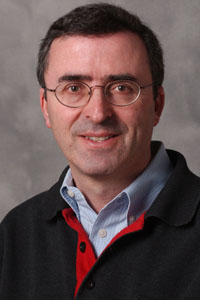 The study was conducted by Shapira and collaborator Jue Wang, an assistant professor at Florida International University. It used data mining techniques to study funding acknowledgements that have been available since 2008 in the Web of Science -- one of the leading international databases of scientific publications. Shapira and Wang analyzed more than 91,000 papers published worldwide between August 2008 and July 2009. The study was conducted by Shapira and collaborator Jue Wang, an assistant professor at Florida International University. It used data mining techniques to study funding acknowledgements that have been available since 2008 in the Web of Science -- one of the leading international databases of scientific publications. Shapira and Wang analyzed more than 91,000 papers published worldwide between August 2008 and July 2009.
They found that although researchers from 152 nations were represented in the survey, just 15 countries represented 90 percent of the papers. The top four countries by author affiliation were the United States (23 percent), China (22 percent), Germany (8 percent) and Japan (8 percent). Papers authored by researchers from more than one nation – which constituted 23 percent of those examined – were assigned to more than one country.
Though the United States and China now produce approximately the same number of papers, the U.S. maintains significant advantages.
"Compared with Chinese counterparts, papers authored by U.S. researchers still have a substantial lead in terms of citation quality and U.S. corporate activity in nanotechnology innovation remains rather larger," Shapira said. "However, Chinese quality is improving and an increasing number of Chinese companies are becoming engaged in developing and commercializing nano-enabled products."
The study analyzed the funding sources cited in a sub-set of 61,300 papers that were supported by grants. The National Natural Science Foundation of China was the top funder, with more than 10,200 publications representing 16.7 percent of all sponsored papers. Second was the U.S. National Science Foundation with 6,700 publications. Rounding out the top five were the Ministry of Science and Technology of China, the European Union’s R&D programs, and the U.S. Department of Health and Human Services -- which includes the National Institutes of Health.
Eight sponsors saw at least 10 percent of the papers they funded garner five or more citations within a year of publication -- the study's definition of an "early-citation" paper. This group is led by four U.S. agencies: the National Institutes of Health, the National Science Foundation, the Department of Energy, and the Department of Defense.
About three percent of U.S. papers reported co-funding from the Chinese National Natural Science Foundation, while a similar proportion of Chinese papers report co-funding from the U.S. National Science Foundation.
"Although these numbers are still low relative to purely nationally-funded papers, they signal a significant trend as China has taken over from European countries as America's leading international collaborator by volume in nanotechnology research," Shapira explained. "China's scientific relationships do, of course, extend beyond the United States, and China has emerged as the hub for nanotechnology research collaboration in Asia."
The study also found that sponsors concentrating their funding in fewer institutions had lower research impact as measured by early citation counts. "Our starting hypothesis is that when groups from multiple institutions vie for funding, there is increased competition, review processes are less partial, and there are more opportunities to select the most improving projects," Shapira explained.
With increasing budget pressures, growth in nanotechnology funding appears unlikely. How should countries invest their limited funding for greatest benefit?
"One way would be to foster more high-quality international collaborations, perhaps by opening funding competitions to international researchers and by offering travel and mobility awards for domestic researchers to increase alliances with colleagues in other countries," the researchers suggested in their paper.
Writer: John Toon
|
Dracula Sheds Light on 19th Century Life
Bram Stoker would have loved Georgia Tech.
Stoker (1847-1912) was a popular Victorian-era writer whose 18 books include romance novels and science fiction as well as Gothic horror. Most people recognize him as the author of the classic vampire tale Dracula, published in 1897, but Carol Senf's interest in the Irish novelist's work is more earthly. A professor and associate chair in the School of Literature, Communication and Culture, Senf is an expert on 19th century Victorian life, attitudes and culture. She studies Stoker's work because it offers unique insights for her research.
Stoker, who received a degree in science and mathematics from Trinity College in his native Dublin, wrote at a time of profound technological and social change, Senf said. "One of the reasons I think Stoker is so interesting is that he incorporates new science and technology of the late 19th and early 20th centuries into his characters' lives."
According to Senf, Stoker was a gadget freak who embraced the, then, newfangled printing machine called a typewriter. Stoker's characters use Edison's phonograph as well as telephones.
"He was one of the first writers to employ an air force in fiction," she added, "and he was the first to use the automobile as a mode of romance in a novel."
He was remarkably modern in his outlook toward women, Senf noted. Dracula and many of his later novels feature assertive, independent female characters, reflecting the changing role of women that was stirring western society at the turn of the century.
Senf points to the example of Lady Athlyne (1908), which features female characters who speak openly and enthusiastically about sex. Many of their interactions with male characters exhibit a degree of intellectual equality quite unusual for the literature of the time. The book's heroine even drives an automobile through the Scottish countryside -- by herself!
While Stoker is an ardent proponent of progress, he is also aware of the anxiety and social tension it produces, Senf noted. "Every once in a while he'll catch himself and think, 'Oh my, this may not be as good as we think it is.'"
Stoker's ambivalence is expressed in Dracula by using the fictional vampire as "a metaphor to articulate concerns about a rapidly changing real world," Senf said.
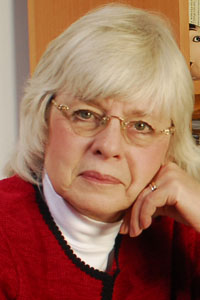 Vampires embody a dead past that's not really dead. "No matter how scientific and technological we get, we're interested in those things over which we have no control," she observed. "And there's a lot over which we have no control." It's a theme still popular today, with some writers substituting zombies for vampires. Vampires embody a dead past that's not really dead. "No matter how scientific and technological we get, we're interested in those things over which we have no control," she observed. "And there's a lot over which we have no control." It's a theme still popular today, with some writers substituting zombies for vampires.
Stoker's concerns about the societal impact of science and technology illustrate a larger point that Senf imparts to her literature students.
"We want scientists and engineers to have a sense that what they do impacts the culture in a big way," she said.
For Georgia Tech students, this awareness takes root with courses at the School of Literature, Communication and Culture.
"It's important for anybody who goes to college to be able to think analytically," said Senf, adding that students learn to organize and sharpen their reasoning skill with ample opportunities to develop their writing ability. In addition, "we have access to so much information today that we need to be able to discriminate good information from better information from the best information, so we need critical readers more than we've ever needed them in the past."
Senf has penned a critical study, Bram Stoker (University of Wales Press, 2010), in addition to Science and Social Science in Bram Stoker's Fiction (Greenwood, 2002) and Dracula: Between Tradition and Modernism (Twayne, 1998), which won the 1995 Lord Ruthven Society award for best non-fiction.
|
February Symposium Will Introduce Negro Leagues Baseball Exhibit
In February, the College will host a symposium and reception introducing on campus the Negro Leagues Baseball Museum’s exhibition “Shades of Greatness – Art Inspired by Negro Leagues Baseball.”
The event and exhibit will be part of the yearlong celebration of the 50th Anniversary of the Matriculation of the Black Students at Georgia Tech and coincide with Black History Month. The history and contributions of African Americans in baseball and in Georgia Tech sports will be highlighted by the symposium. Location, date, and time of the event will be announced through the Ivan Allen College and Georgia Tech calendars and on the 50th Anniversary website.
|
In Brief
Herbst Selected President of University of Connecticut
 Susan Herbst, Chief Academic Officer of the University System of Georgia and Professor in Ivan Allen College School of Public Policy, was named the University of Connecticut's 15th president, becoming the first woman to hold that position in the school's history. According to an article in the Wall Street Journal, Herbst was selected unanimously by UConn's Board of Trustees, who called her an "exceptional leader in higher education who will use her enthusiasm and experience to help UConn push ahead academically and in research". "I couldn't be more honored," Herbst said. "UConn is the envy of the nation, and I hope to make it better." Read more in Wall Street Journal- December 20, 2010 Susan Herbst, Chief Academic Officer of the University System of Georgia and Professor in Ivan Allen College School of Public Policy, was named the University of Connecticut's 15th president, becoming the first woman to hold that position in the school's history. According to an article in the Wall Street Journal, Herbst was selected unanimously by UConn's Board of Trustees, who called her an "exceptional leader in higher education who will use her enthusiasm and experience to help UConn push ahead academically and in research". "I couldn't be more honored," Herbst said. "UConn is the envy of the nation, and I hope to make it better." Read more in Wall Street Journal- December 20, 2010
Barke Leads Planning for X-College
.jpg) Richard Barke, Associate Professor in the School of Public Policy, is chairing the committee planning Georgia Tech's new X-College. Usha Nair-Reichert, Associate Professor in the School of Economics, and Public Policy major Elle Creel are also members of the planning team which includes faculty, adminstrators, and students from across the Institute. The X-College initiative developed during Georgia Tech’s yearlong strategic planning process. The committee, assembled by Georgia Tech Provost Rafael L. Bras, will review options and formulate strategies for its creation. Richard Barke, Associate Professor in the School of Public Policy, is chairing the committee planning Georgia Tech's new X-College. Usha Nair-Reichert, Associate Professor in the School of Economics, and Public Policy major Elle Creel are also members of the planning team which includes faculty, adminstrators, and students from across the Institute. The X-College initiative developed during Georgia Tech’s yearlong strategic planning process. The committee, assembled by Georgia Tech Provost Rafael L. Bras, will review options and formulate strategies for its creation.
Lu Honored for Academic Excellence
 Hanchao Lu, Professor in the School of History, Technology, and Society has been awarded the 2010 Honor for Academic Excellence by the Association of Chinese Historians in the United States, an affiliate of the American Historical Association (AHA). Lu was recognized for his work on the books, The Birth of A Republic: Francis Stafford's Photographs of China's 1911 Revolution and Beyond (University of Washington Press, 2010), A Man of Two Worlds: The Life of Sir Robert Hart, 1835-1911 (Shanghai Academy of Social Sciences Press, 2009), "Small Town China: A Historical Perspective on Rural-Urban Relations," in One Country, Two Societies: Rural-Urban Inequality in Contemporary China (Harvard University Press, 2010), along with two articles published in Chinese. He received the award during the annual AHA meeting in Boston on January 8, 2011. Hanchao Lu, Professor in the School of History, Technology, and Society has been awarded the 2010 Honor for Academic Excellence by the Association of Chinese Historians in the United States, an affiliate of the American Historical Association (AHA). Lu was recognized for his work on the books, The Birth of A Republic: Francis Stafford's Photographs of China's 1911 Revolution and Beyond (University of Washington Press, 2010), A Man of Two Worlds: The Life of Sir Robert Hart, 1835-1911 (Shanghai Academy of Social Sciences Press, 2009), "Small Town China: A Historical Perspective on Rural-Urban Relations," in One Country, Two Societies: Rural-Urban Inequality in Contemporary China (Harvard University Press, 2010), along with two articles published in Chinese. He received the award during the annual AHA meeting in Boston on January 8, 2011.
Schneer's Balfour Wins Jewish Book Council Award
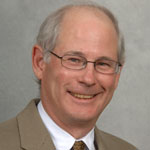 Jonathan Schneer has won the Jewish Book Council’s 2010 National Jewish Book Award. Professor in the School of History, Technology, and Society, Schneer won in the category of Writing based on archival material for his book: The Balfour Declaration: the Origins of the Arab-Israeli Conflict. Jonathan Schneer has won the Jewish Book Council’s 2010 National Jewish Book Award. Professor in the School of History, Technology, and Society, Schneer won in the category of Writing based on archival material for his book: The Balfour Declaration: the Origins of the Arab-Israeli Conflict.
HTS' Undergrad To Present Paper
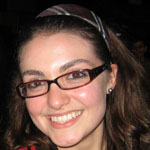 Hannah Farhan, an undergraduate student in the School of History, Technology, and Society, will be presenting the paper she worked on at University of Sheffield, UK at one of the general sessions of the 46th International Congress on Medieval Studies in Kalamazoo, Michigan this May. Her paper is entitled “Retroactive Heresy: How the Early Christian Heresies Influenced the Identification and Reaction to the Heretical Sects of the High Middle Ages”. Hannah Farhan, an undergraduate student in the School of History, Technology, and Society, will be presenting the paper she worked on at University of Sheffield, UK at one of the general sessions of the 46th International Congress on Medieval Studies in Kalamazoo, Michigan this May. Her paper is entitled “Retroactive Heresy: How the Early Christian Heresies Influenced the Identification and Reaction to the Heretical Sects of the High Middle Ages”.
|
Hard Labor or How An Undergraduate’s First Research Project Became Published in a Peer-Reviewed Journal
Research journals in social science often accept for publication fewer than 10 percent of the papers submitted, that’s about 30-50 out of the 1000 or so they receive each year. Those numbers reveal the remarkable accomplishments of first-time student researcher, Mitchell Watkins.
“This was an undergraduate in our college doing professional research,” said Zak Taylor, an assistant professor in the Sam Nunn School of International Affairs (INTA) who has been Watkin’s mentor. “Publishing in the social sciences is a long and arduous process, many masters and PhDs students don’t achieve it, yet this paper went from Mitch learning the rudiments of a research proposal in Fall 2009 to publication in November 2010.”
The genesis for Watkin’s paper was an assignment for the Economics and International Affairs capstone class (ECON/INTA 4740/4741 Senior Thesis Seminar) taught by Taylor and Olga Shemyakina, Assistant Professor School of Economics. In the first semester, Watkins and his classmates studied the rudiments of research: research methods, regressions, and probability and statistics, and they developed a research proposal. In the second semester, students focused on executing the proposal and developing a high quality paper that could potentially be published in an undergraduate or professional journal.
Last May, when Watkins completed his thesis, Taylor evaluated the article and offered Watkins assistance in submitting it to an undergraduate or professional journal. Watkins was busy graduating, but during the summer decided to try to publish and the two began working on revisions.
.jpg) “Dr. Taylor did a substantial amount of work to clean up the language of the entire paper and elevate it to the standards required by professional journals,” explained Watkins. “In particular, he did an amazing job restructuring the literature review and developing the analysis of the results/conclusion.” “Dr. Taylor did a substantial amount of work to clean up the language of the entire paper and elevate it to the standards required by professional journals,” explained Watkins. “In particular, he did an amazing job restructuring the literature review and developing the analysis of the results/conclusion.”
Taylor then submitted the paper and handled further revisions. In November, 2010, “Intellectual Property Protection and U.S. Foreign Direct Investment in Emerging Economies”, was published in the Journal of Intellectual Property Rights, a peer-review specialized sub-field research journal that tracked by the major search databases, including Thomson-ISI's "Web of Science". Watkins is listed as the first author, Taylor as co-author.
“All the data, methods, and analysis are his,” said Taylor. “The research environment requires constant self-assessment, reassessment, and critical assessment. Mitch was willing to confront failure and through that learn what makes a good or bad research question, a good or bad justification. He was absolutely tenacious and achieved this caliber of work through hard work, dedication, and focus.”
Taylor’s dedication, passion, and support were also key to Watkins’s success. A previous undergraduate student of his was also published and another Taylor student is moving along the same track.
Having a published paper is, obviously, impressive on a resume; Watkins shared advice for other students interested in the process.
“First and foremost is to choose a research topic that truly interests you. It will make the entire research process a lot easier and more enjoyable.”
He also recommends working with a professor as he did with Taylor and Shemyakina. Also helpful, was Watkins research internship in the Center for International Strategy, Technology, and Policy (CISTP) where he conducted research on international terrorism and unconventional weapons under the supervision International Affairs Assistant Professor Margaret Kosal. “I have found that working with a professor is tremendously valuable and a great learning experience. Professors will help you learn good research methods and help you develop your writing skills,” said Watkins.
“My final piece of advice is to learn and practice good research methods. This applies to research in all disciplines of study. It is crucial to constantly consider the validity of your research.”
Watkins experience exemplifies the approach that the College tries to take with its students. “We try to go beyond assigning term papers by incorporating undergraduates into our own research, we train our students to be professional scientists, ready for the job market,” said Taylor.
Watkins graduated in Spring 2010. He is currently working as an analyst at an aviation consulting firm in Denver, Colorado. He says the published paper positions him well in his career and for continuing his education in a few years.
Top photo: Mitchell Watkins
Bottom photo: Zak Taylor
|
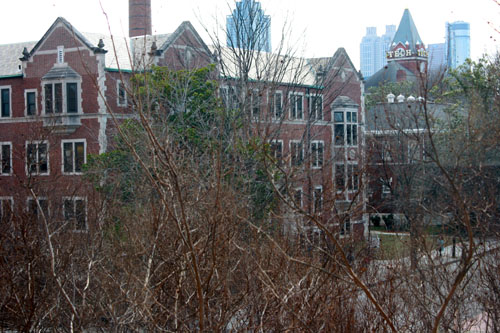
|
This Month's Banner Photo
This month's banner photo was taken across the rooftop of the D.M. Smith building on Cherry Street, home to our School of Public Policy
|
|

